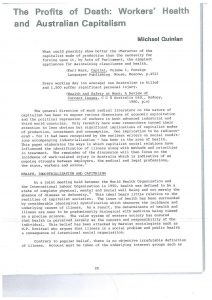 Professor Michael Quinlan has been writing about occupational health and safety (OHS) and industrial relations for several decades. His writing has matured over that time as indicated by his most recent book, Ten Pathways to Death and Disaster. In 1980, one of his articles looked at OHS through the prisms of Capitalism and Marxism. It is remarkable how much an article that was written early in Quinlan’s career and at a time when OHS was considered another country remains relevant today. This perspective contrasts strongly with the current dominant thinking on OHS and as a result sounds fresh and may offer some solutions.
Professor Michael Quinlan has been writing about occupational health and safety (OHS) and industrial relations for several decades. His writing has matured over that time as indicated by his most recent book, Ten Pathways to Death and Disaster. In 1980, one of his articles looked at OHS through the prisms of Capitalism and Marxism. It is remarkable how much an article that was written early in Quinlan’s career and at a time when OHS was considered another country remains relevant today. This perspective contrasts strongly with the current dominant thinking on OHS and as a result sounds fresh and may offer some solutions.
In Quinlan’s 1980 article, “The Profits of Death: Workers’ Health and Capitalism”*, he writes that
“contrary to popular belief there is no objective irrefutable definition of illness”.
This could equally be applied to safety. But searching for THE definition of things can lead to everlasting colloquia of academic experts without helping those who need to work within and apply safety concepts.


 Occupational health and safety (OHS) law in the United States has little impact on that of any countries outside of North America. But the response to those OHS laws by US and multinational companies indicates corporate approaches to workplace safety and this can spread round the world. The anticipated strategy to worker safety under the Presidency of Donald Trump is expected to be harsh, if he attends to it at all.
Occupational health and safety (OHS) law in the United States has little impact on that of any countries outside of North America. But the response to those OHS laws by US and multinational companies indicates corporate approaches to workplace safety and this can spread round the world. The anticipated strategy to worker safety under the Presidency of Donald Trump is expected to be harsh, if he attends to it at all.